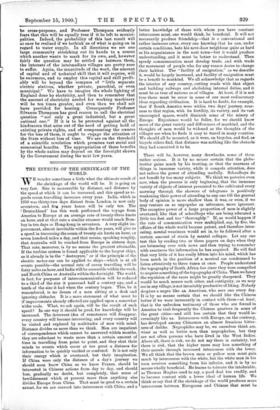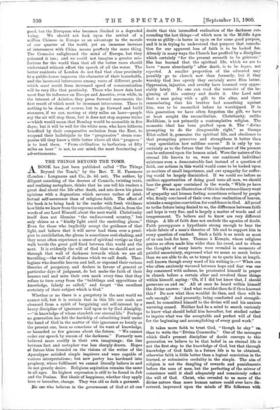THE EFFECTS OF THE SHRINKAGE OF THE WORLD.
WE wonder sometimes a little what the ultimate result of the shrinkage of the world will be. It is going on very fast. Size is measurable by distance, and distance by the speed at which it can be traversed, and this speed as re- gards ocean travelling increases every year. India, which in 1850 was thirty-two days distant from London, is now only seventeen, and fiv, years hence will be only ten. The Deutschland' has this week performed the voyage from America to Europe at an average rate of twenty-three knots an hour, and at that rate a similar steamer would reach Bom- bay in ten days or Hong-kong in seventeen. A very slight im- provement, almost inevitable within the five years, will give us a speed in traversing the ocean of twenty-six knots an hour, cr seven hundred miles a day, and that means, speaking roughly, that Australia will be reached from Europe in sixteen days. That rate, moreover, is by no means the greatest attainable. If the turbine system is found applicable to the largest ships, as it already is to the " destroyers," or if the principle of the electric motor-car can be applied to ships—which is at all events possible—the normal rate of ocean travelling will be forty miles an hour, and India will be accessible within the week, and North China or Australia within the fortnight. The world, in fact, for proposes of intercommunication will be reduced to a third of the size it possessed half a century ago, and a tenth of the size it had when the century began. This, be it remembered, is no dream of a man sitting at a desk and ignoring obstacles. It is a mere statement of what must be if improvements already effected are applied upon a somewhat wider scale. What, we ask again, will be the result of such speed P In one way it should be good, for knowledge will be increased. The deterrent idea of remoteness will disappear, every country will become interesting, and every country will be visited and explored by multitudes of men with mind. Distance divides us more than we think. Men are impatient of correspondence which cannot be answered within months, they are reluctant to waste more than a certain amount of time in travelling from point to point, and they shut their minds to events which occur at too great a distance for information to be quickly verified or confuted. It is not only their energy which is overtaxed, but their imagination. If China were only the distance of a day's journey we should soon know China as we know France, should be interested in Chinese actions from day to day, and should lose, gradually no doubt, but completely, that sense of bewilderment which at present more than anything else divides Europe from China. That must be good to a certain extent, for we are coerced into intercourse with China, and a
better knowledge of those with whom you have constant intercourse must, one would think, be beneficial. It will not necessarily produce friendship—that is a conventional and rather insincere error, every one knowing that he can, under certain conditions, hate his next-door neighbour quite as hard as his acquaintance in the next town—but it would produce understanding, and it must be better to understand. Then speedy communication must develop trade, and with trade the movement of people who for any reason desire to change their habitat. The " facility of emigration," as we describe it, would be largely increased, and facility of emigration must be a benefit to mankind. We all acknowledge that as regards the interior of any country, cutting roads with that object and building railways and abolishing internal duties, and it must be as true of nations as of villages. At least, if it is not true there must be error in some of our most rudimentary ideas regarding civilisation. It is hard to doubt, for example, that if South America were within two days' journey, near- ness to that region, with its fertility, its variety, and its vast unoccupied spaces, would diminish some of the misery of Europe. Experience would be fuller, for we should know more of the great variety and differences of mankind, and the thoughts of men would be widened as the thoughts of the villager are when be finds it easy to travel in many counties. We should all be mounted, as it were, on bicycles, and find, as bicycle riders find, that distance was nothing like the obstacle they had conceived it to be.
There will be, however, many drawbacks, some of them rather serious. It is by no means certain that the globe- trotter gains much by his trotting, or that the nearness of things in immense variety, while it compels attention, does not reduce the power of attending usefully. Schoolboys do not benefit by too many subjects. We think we perceive even now, when the process is only beginning, that the immense variety of objects of interest presented to the cultivated every morning through the showers of telegrams is positively weakening their power of attending to any one till the general body of opinion is more shallow than it was, or even, if we may venture on so unpopular an utterance, more ignorant. The receptive power of a large proportion of men is slightly overtaxed, like that of schoolboys who are being educated a little too fast and too " thoroughly." If, as would happen if the rate of communication were multiplied, say, by five, the affairs of the whole world became patent, and therefore inter- esting, mental weariness would set in, to be followed after a certain amount of strain by mental collapse. Let any one test this by reading two or three papers on days when they are brimming over with news and then trying to remember with exactness the information he has acquired. He will find that very little of it has really bitten into his mind, which has been much in the position of a musical ear condemned to listen attentively to three tunes at once. People understand the topography of South Africa less since they were compelled to acquire something of the topography of China. Then we fancy the repulsion of the races might be greatly sharpened. They would be much nearer each other, and contiguity, as we may see in any village, is net invariably productive of liking. Nobody despises a negro like an American, who sees one every day. It is by no means certain that we should like the Chinese better if we were incessantly in contact with them—at least, that is the unbroken testimony of those who are forced in America to visit frequently the Chinese quarters in some of the great cities—and still less certain that they would in- creasingly like us. Intercourse with Europe, on the contrary, has developed among Chinamen an almost ferocious bitter- ness of dislike. Negrophiles may be, we ourselves think are, wiser as well as better men than negrophobes, but they are not often persons who have lived in the West Indies. Above all, there is risk, we do not say there is certainty, but there is risk, that the higher races may lose something of their morale through increased intercourse with the lower. We all think that the brown man or yellow man must gain much by intercourse with the white, but the white man in his turn receives something from his inferior, and it is by no means wholly beneficial. He learns to tolerate the intolerable, as Thomas Hughes used to say, a good deal too readily, and to become content with a lower ideal of human life. We think or say that if the shrinkage of the world produces more intercourse between Europeans and Chinese that must be
good, but the European who becomes Sinified is a degraded being. We should not look upon the arrival of a million Chinese in Europe as an advantage to the morale of our quarter of the world, yet an immense increase of intercourse with China means prealsely the same thing. The Crusades enlightened the mind of Europe, but they poisoned it too ; and we could not imagine a greater mis- fortune for the world than that all the better races should understand without effort the speech of all the worse. The better residents of London do not find that close proximity to a public-house improves the character of their households, and the increased intercourse among races of different grade which must result from increased speed of communication will be very like that proximity. Those who know Asia best most fear its influence on Europe and America, even while, in the interest of Asiatics, they press forward movements the first result of which must be incessant intercourse. There is nothing to be done, of course, but to go forward and build steamers, if we can, moving at sixty miles an hour—people say the air will stop them, but it does not stop express trains —which would mean that Bombay would be accessible in five days; but it will be well for the white men, who have hitherto benefited by their comparative seclusion from the East, to suspend their hallelujahs to the " progressive " steam com- panies till they know a little better where all this " progress " is to land them. " From civilisation to barbarism at fifty miles an hour" is not, to our mind, the most fascinating of advertisements.







































 Previous page
Previous page